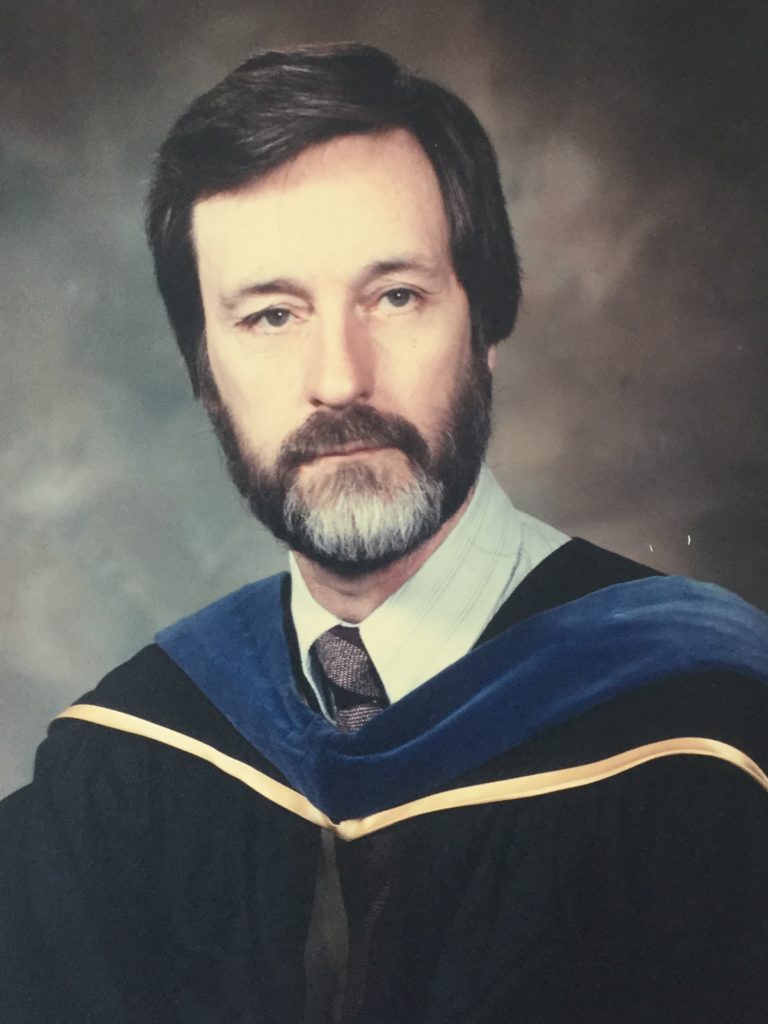
Professor Emeritus and Senior Scholar Hugh Parry died peacefully on March 30 in Victoria, B.C. with his family beside him. He is survived by his wife, Harriet, his son Kevin (of Cotignac), his daughter Megan (Jason), and two grandchildren, Jude and Ben.

Parry was born in Liverpool, England, on July 11, 1934. He obtained his BA and MA at Magdalene College at the University of Cambridge in 1959, and then won a Fulbright Scholarship and read for his PhD at the University of California, Berkeley. He successfully defended his dissertation, “The Choral Odes of Euripides: Problems of Structure and Dramatic Relevance” in 1963.
Parry was an authority on ancient Greek literature and magic, and a foundational figure in the Division of Humanities (now the Department of Humanities) and the Classical Studies program at York University. One of the first faculty members to be appointed in humanities, he played a role in establishing the University’s general education curriculum, its Greek and Latin language classes, and its degree program in classical studies. Parry also held significant leadership positions at the University during its early decades. He is remembered as a receptive and supportive colleague, with a warm smile and gentle demeanour.
In 1963, Parry was appointed lecturer in the Division of Humanities at York, together with Bill Whitla. Before this, the only permanent member of the division was its founding Chair, Bill Kilbourn. Initially, Parry’s main responsibility was to teach Latin, although, in his first year, he also taught ancient Greek on unpaid overload. As his career progressed, he taught the full range of Greek and Latin classes, as well as courses on ancient literature and culture.
Parry also contributed to the establishment of the general education curriculum in humanities. He taught the first-ever humanities course (Hum 1) with Kilbourn and Whitla. The course was described as “a selective study of ideas, institutions, religion, literature and the arts,” and concentrated on classical Greece, the Age of St. Augustine, and Europe from the 11th to 16th century. The course covered a diverse range of texts, including selections from the Bible, Homer, Sophocles, Plato, Augustine and Dante. Parry's other courses included Roots of Western Culture, a version of which is still a staple of the general education offerings in humanities. Whitla remembers Parry as “a lovely teacher, informed, gentle, compelling, [and] well-organized.” As a result of his success as a teacher, Parry won the Faculty of Arts Teaching Award in 1991.
Parry's leadership contributions at the University were extensive. As the inaugural director of classics (1963-71), he was the driving force behind the appointment of six new colleagues in Greek and Roman literature and history. This spate of appointments laid the groundwork for the establishment of a degree program in classical studies, which began in 1971-72. In 1967, Parry was also part of a committee that thoroughly revised the humanities curriculum to include coverage of a greater range of cultural traditions and social movements. As well as chairing many committees in humanities and the Faculty of Arts, he was Chair of the Division of Humanities from 1979-85. He also had a longstanding involvement with Founders College – Fellow of the College from its establishment in 1965, he served as master (1970-76) and continued to sit on college committees after stepping down from the headship.
His professional contributions to his discipline were considerable. He was the author of three monographs and 15 book chapters and articles, the latter appearing in leading North American Classics journals, including the American Journal of Philology, Échos du monde classique, Phoenix, and Transactions of the American Philological Association. As the title of his dissertation suggests, Parry’s initial focus was on Greek tragic drama, and this work resulted in several articles and his first monograph, The Lyric Poems of Greek Tragedy (1978). One reviewer of the book commented that “as one would expect from Parry’s earlier publications on Greek and Latin poetry, the work is intelligent, sensitive, often eloquent."
Tragedy was not the sole focus, however, there were studies on Homer, the anonymous Homeric Hymn to Aphrodite, Pindar, Simonides and Theocritus, as well as the Latin authors Plautus and Ovid. His article on Ovid’s depiction of rape in a pastoral landscape is acknowledged as a classic and has prompted many to examine similar themes in Ovid’s poetry. Towards the end of his career, Parry developed an interest in magic and its literary representations. This trajectory culminated in more articles and a second book, Thelxis: Magic and Imagination in Greek Myth and Poetry (1992).
Aside from making contributions to classics through his published work, Parry was the president of the Ontario Classical Association (1968-70). He also served on the board of the Canadian journal Phoenix (1977-79) and as the journal’s reviews editor (1992-96).
He was promoted from lecturer to assistant professor in 1964, and then to associate professor (with tenure) in 1968. Parry retired as a full professor in 1996, a rank that he held since 1971. In retirement, he published Visions of Enchantment: Essays on Magic in Fiction (2001). The book arose from lectures delivered during his teaching career and reflects the broad cultural horizons characteristic of York humanities; it deals with authors as diverse as Homer, Lucan, Samuel Taylor Coleridge, W. B. Yeats, John Fowles and Marion Zimmer Bradley.
Upon his retirement, Parry continued to reside in Toronto, but lived for part of each year in the south of France, in Cotignac. He is to be cremated privately and a commemorative gathering for family and friends is planned for the summer.
An obituary was shared on the Faculty of Liberal Arts & Professional Studies website.
Written by Associate Professor Ben Kelly in collaboration with senior members of York's Department of Humanities and Classical Studies program.
